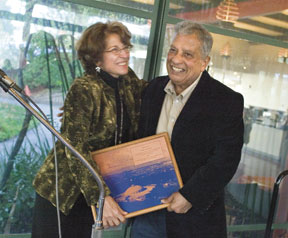

 Aloke Chatterjee, a theoretical radiation biophysicist and former deputy director of the Life Sciences Division who gave this laboratory 36 years of exemplary service before retiring in 2006, passed away on Saturday, June 20, 2009 at his home in Clayton, CA at the age of 68. The cause was heart failure.
Aloke Chatterjee, a theoretical radiation biophysicist and former deputy director of the Life Sciences Division who gave this laboratory 36 years of exemplary service before retiring in 2006, passed away on Saturday, June 20, 2009 at his home in Clayton, CA at the age of 68. The cause was heart failure.
Born and raised in New Delhi, Aloke came to Berkeley Lab in 1970 - the same year he married his wife, Cathy - after getting his Ph.D. in chemical physics from Notre Dame University. His bachelor's and master's degrees were obtained in physics from the University of Delhi. At Berkeley Lab his research centered on the risks of low-dose ionizing radiation in the development of human cancers. He was specifically interested in identifying the molecular mechanisms associated with damage to DNA, which are considered critical to public safety.
From 1989 to 2001, Aloke served as the deputy director of the Life Sciences Division. During much of this period, he also served as department head for that division’s Radiobiology group. Mina Bissell (pictured with Chatterjee at his retirement) was the Life Sciences Division director during this time.
“Aloke was always the problem-solver, especially when it came to difficult and thorny personality issues,” Bissell once said. “He was always constructive and kind, and was able to solve a great many problems behind the scenes. The Life Sciences Division and the Laboratory as a whole owe him a great debt.”
In addition to his award-winning science and numerous other contributions to Berkeley Lab, Aloke Chatterjee also served on numerous review panels for DOE and NIH. His expertise in low-dose ionizing radiation led him to become the first director of NASA's Specialized Center of Research and Training (NSCORT), which, among other things, looked at the effects of radiation in space on biological functions at the cellular and molecular level. He served two consecutive five-year terms as NSCORT's director.
Despite retiring in 2006, Aloke continued his involvement with the Life Sciences Division as a senior adviser to the current division director Joe Gray. He also continued to serve as mentor to all who asked. As he said at the time he retired, “As a scientist, you cannot stop your brain from thinking,” he said. “I would like to help with the younger scientists.”
Mentoring young scientists was one of Aloke’s passions in his later years here at Berkeley Lab. At the time of his retirement he was asked what advice would he offer to young scientists just beginning their careers here.
“The best advantage of working at this Laboratory is the human resources; we have so many excellent scientists over such a wide range of different disciplines,” Aloke said. “Young researchers should try to interact with as many other scientists from related fields of interest as they can. This is what I did and I gained a lot from the experience.”
Aloke is survived by his wife Cathy, his son, Niloy, his daughter Dalia, and grandchildren Tyler, Alexandra and Preston. A memorial service is planned for later this summer. Details will be shared when available.
Today at Berkeley Lab is produced by Public Affairs' Communications Department